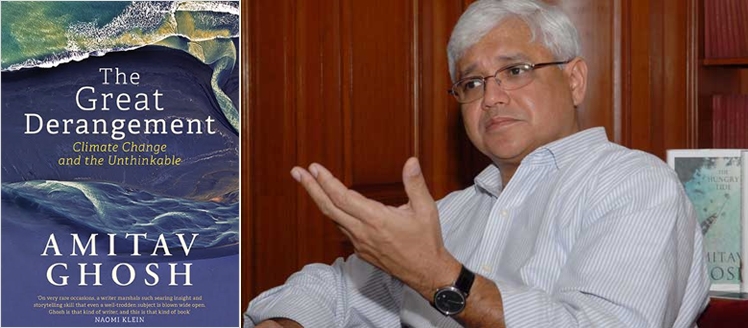
Good Earth Gone Bad: Amitav Ghosh Shares Concerns About Climate Change
After the historically potent “Ibis trilogy”, Amitav Ghosh, a Bengali author surprised everyone by shifting gears in his very next work— this time to address a geographical reality. The just released book, titled “The Great Derangement”, is a work of non-fiction. In his book, he shares concern about the climate is about droughts — and cyclones and floods. It describes how vulnerable Mumbai is to climate change, and how unprepared to deal with its consequences.

Ghosh points out that the phenomenon of climate change cannot be severed from history and political upheavals. In fact, the connection between them is a deep and a complex one, he argues.
What is common between Mumbai’s coastline and Miami beach? Writer Amitav Ghosh says both are likely areas to be worst affected by climate change. “When you look at the Mumbai coastline, you see these beautiful homes. I look at them and think these homes are profoundly in danger,” says Ghosh, who was recently in Mumbai to launch his brand-new book on climate change. He was in conversation with columnist Anil Dharker.
“Climate change is here. We are experiencing it already. 26/07 (the July 2005 floods) was an apocalyptic event. The world is no longer a predictable bourgeois world,” he says. According to Ghosh, the association of the idea of freedom with images of “a person in a convertible, wind blowing in the hair,” has actually caused irreparable damage to climate patterns in the world. “The frontier of the problem is culture.
Fundamentally, it’s the cultural consumption that we have to address,” he says. While climate change will invariably affect other Indian cities adversely too, it is Mumbai’s geographical location that positions it uniquely in danger’s way. “It (Mumbai) is this thin finger of land stretching into the sea,” says Ghosh.
“When a storm comes, it will hit Mumbai directly. It will be monumental in size. It will come from both sides and Mumbai will be blanketed by it,” he says. Ghosh has actually more words of doom: the fact that the city lacks a cogent and viable evacuation plan. “If you try thinking of evacuating only South Mumbai’s population, there are 11 million people and two narrow roads that will submerge later,” he says. In the face of disaster, that picture should pretty much put the brakes on anyone imagining a quick getaway, in a swank convertible, wind blowing in the hair.